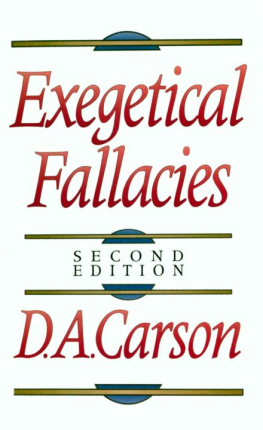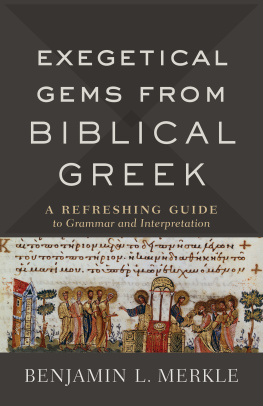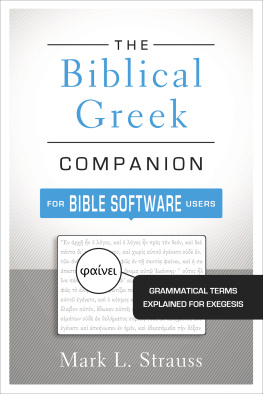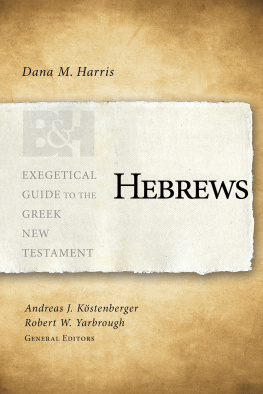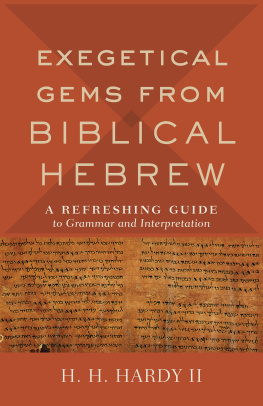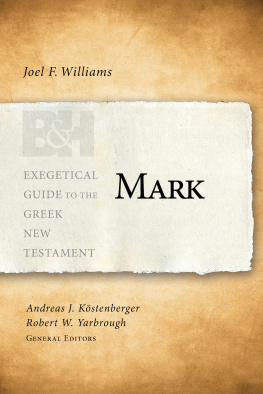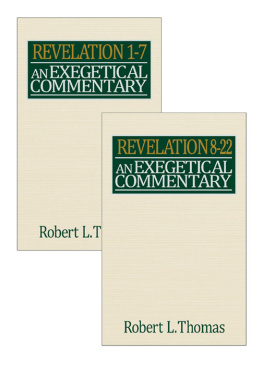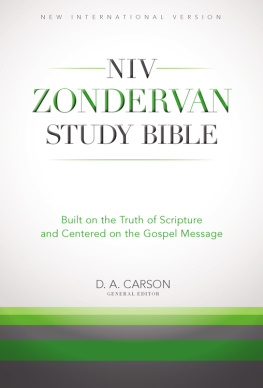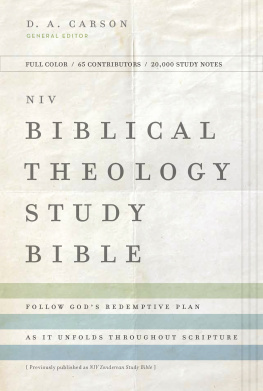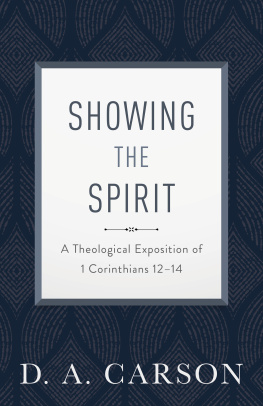D.A. Carson - Exegetical Fallacies
Here you can read online D.A. Carson - Exegetical Fallacies full text of the book (entire story) in english for free. Download pdf and epub, get meaning, cover and reviews about this ebook. year: 1983, publisher: Baker Book House, genre: Religion. Description of the work, (preface) as well as reviews are available. Best literature library LitArk.com created for fans of good reading and offers a wide selection of genres:
Romance novel
Science fiction
Adventure
Detective
Science
History
Home and family
Prose
Art
Politics
Computer
Non-fiction
Religion
Business
Children
Humor
Choose a favorite category and find really read worthwhile books. Enjoy immersion in the world of imagination, feel the emotions of the characters or learn something new for yourself, make an fascinating discovery.
Exegetical Fallacies: summary, description and annotation
We offer to read an annotation, description, summary or preface (depends on what the author of the book "Exegetical Fallacies" wrote himself). If you haven't found the necessary information about the book — write in the comments, we will try to find it.
Exegetical Fallacies — read online for free the complete book (whole text) full work
Below is the text of the book, divided by pages. System saving the place of the last page read, allows you to conveniently read the book "Exegetical Fallacies" online for free, without having to search again every time where you left off. Put a bookmark, and you can go to the page where you finished reading at any time.
Font size:
Interval:
Bookmark:

D. A. Carson

W. Gordon Brown In Memoriam
The surprising success of this book suggests that there is an encouraging number of preachers and teachers of Scripture who want to correct common errors in exegesis. I am grateful to God if this book has been a help.
Many readers have written to share with me their own lists of amusing fallacies. A few of their suggestions have found their way into the pages of this second edition. Three or four reviewers or letter writers strenuously objected to this or that example. I have tried to take their complaints to heart. In a couple of instances I have revised the section; in two or three instances I merely dropped the material or substituted better examples, not always because I thought I was wrong on the issue, but simply because in this book I am not trying to score points on particular subjects so much as give indisputable examples of exegetical fallacies. But most of the material in the first edition has been retained here. Occasionally I have dropped material not because I have changed my mind as to the exegesis, but because I would defend my position a little differently today.
By contrast, from time to time I have inserted fresh examples. In addition, the material in the fourth chapter has been expanded somewhat. Granted the rapid changes taking place in the field of hermeneutics, that chapter could easily have become a couple of books. Restraint prevailed, so that not too many pages were added.
I would have liked to expand the fifth chapter, but it seemed best not to enlarge the book too much at one go, not least because it is primarily used as auxiliary reading in exegesis courses, so that too great an increase in length would probably destroy its usefulness. In particular, I rather wanted to say more about the interpretation of literary genres than I did. The little I added may be of use to some. And if this book ever goes to a third edition, perhaps that will be the time to add more to the fifth chapter.
Soli Deo gloria
D. A. Carson
Most of the material in this book was first delivered at the Spring Lectureship sponsored by Western Conservative Baptist Seminary in Portland, Oregon, in 1983. It is a pleasure to record my thanks to James DeYoung, the chairman of the Lectureship Committee, not only for the invitation, but also for efficient arrangements and boundless courtesy. My thanks, too, to the faculty members and students who went out of their way to make me feel welcome.
Some of the material in these pages still retains elements of its genesis in lectures, although the notes, of course, played no part in the original series. Far more of my examples have been taken from New Testament scholarship than Old Testament scholarship, not only because that reflects my relative expertise, but even more because many of these examples have been drawn from classroom material culled over the years in the course of teaching students responsible exegesis of the New Testament. Although my reading of Old Testament scholarship assures me that comparable examples are no less frequent in that corpus, to prevent this book from growing out of bounds I have decided to retain the original limits.
Some of those who have heard or read part or all of this material have sometimes criticized me for being unfair to their preferred viewpoint on some theological or exegetical point. I have tried to listen to their criticisms and make changes where needed; but I am encouraged to note that approximately the same proportion of Baptists as Paedo-baptists, Calvinists as Arminians, and so forth, have voiced objections and suggestions, so perhaps the balance is not too far off. I can only insist in the strongest terms that I have tried not to use these pages as a sounding board by which to give vent to personal prejudices. Doubtless I have in some measure failed, but readers who take too great offense in discovering just where I have damaged their preferred interpretations might profitably ask themselves to what extent their own prejudices have influenced their judgment.
My secretary Marty Irwin typed the manuscript under extremely short notice and considerable pressure; I am profoundly grateful for her efficiency and enthusiasm. Mark Reasoner gave valuable assistance with two of the indexes.
Soli Deo gloria.
To focus on fallacies, exegetical or otherwise, sounds a bit like focusing on sin: guilty parties may take grudging notice and briefly pause to examine their faults, but there is nothing intrinsically redemptive in the procedure. Nevertheless, when the sins are common and (what is more) frequently unrecognized by those who commit them, detailed description may have the salutary effect of not only encouraging thoughtful self-examination but also providing an incentive to follow a better way. I hope that by talking about what should not be done in exegesis, we may all desire more deeply to interpret the Word of God aright. If I focus on the negative, it is in the hope that readers will thereby profit more from the positive instruction they glean from texts and lectures.
Before pressing on to the study itself, I shall avoid distracting questions later if at the outset I sketch the importance of this study and the dangers inherent in it, and frankly acknowledge the many limitations I have adopted.
The Importance of This Study
This study is important because exegetical fallacies are painfully frequent among us-among us whose God-given grace and responsibility is the faithful proclamation of the Word of God. Make a mistake in the interpretation of one of Shakespeare's plays, falsely scan a piece of Spenserian verse, and there is unlikely to be an entailment of eternal consequence; but we cannot lightly accept a similar laxity in the interpretation of Scripture. We are dealing with God's thoughts: we are obligated to take the greatest pains to understand them truly and to explain them clearly. It is all the more shocking, therefore, to find in the evangelical pulpit, where the Scriptures are officially revered, frequent and inexcusable sloppiness in handling them. All of us, of course, will make some exegetical mistakes: I am painfully aware of some of my own, brought to my attention by increasing years, wider reading, and alert colleagues who love me enough to correct me. But tragic is the situation when the preacher or teacher is perpetually unaware of the blatant nonsense he utters, and of the consequent damage he inflicts on the church of God. Nor will it do to be satisfied with pointing a finger at other groups whose skills are less than our own: we must begin by cleaning up our own backyard.
Font size:
Interval:
Bookmark:
Similar books «Exegetical Fallacies»
Look at similar books to Exegetical Fallacies. We have selected literature similar in name and meaning in the hope of providing readers with more options to find new, interesting, not yet read works.
Discussion, reviews of the book Exegetical Fallacies and just readers' own opinions. Leave your comments, write what you think about the work, its meaning or the main characters. Specify what exactly you liked and what you didn't like, and why you think so.

